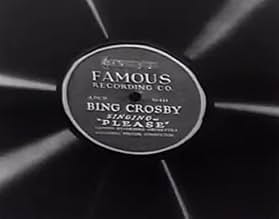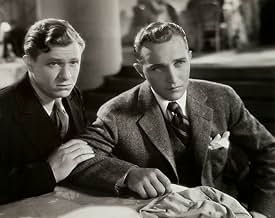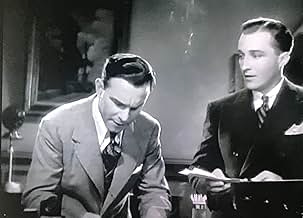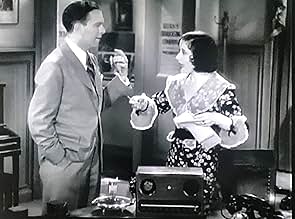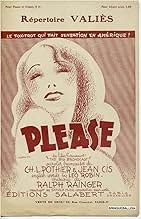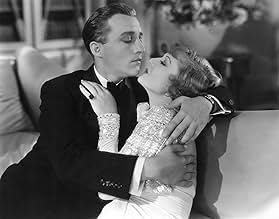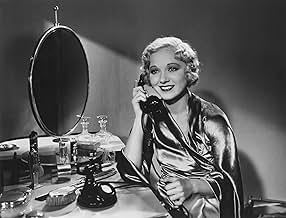Agrega una trama en tu idiomaA radio-singer, Bing Crosby, is none-too-concerned about his job, and an affair with Mona leads to his dismissal. When it appears Hornsby is getting and paying a lot of attention to his fian... Leer todoA radio-singer, Bing Crosby, is none-too-concerned about his job, and an affair with Mona leads to his dismissal. When it appears Hornsby is getting and paying a lot of attention to his fiancée, Anita Rogers, station manager Leslie McWhinney buys the station, gives Hornsby his jo... Leer todoA radio-singer, Bing Crosby, is none-too-concerned about his job, and an affair with Mona leads to his dismissal. When it appears Hornsby is getting and paying a lot of attention to his fiancée, Anita Rogers, station manager Leslie McWhinney buys the station, gives Hornsby his job back, and goes on a honeymoon with Anita.
- Dirección
- Guionistas
- Elenco
- Premios
- 1 premio ganado en total
- George
- (as Burns and Allen)
- Gracie
- (as Burns and Allen)
- Dirección
- Guionistas
- Todo el elenco y el equipo
- Producción, taquilla y más en IMDbPro
Opiniones destacadas
"The Big Broadcast" has Bing (also his character's name) more preoccupied with his fiancee Mona Lowe (Sharon Lynn) than his radio show when he shows up late for his broadcasts. The manager, George Burns (yes, the comedian), is on the verge of losing his radio station to bankruptcy. The movie's premise parallels Bing's early radio career when he didn't appear for the first couple of days to his premier '15 Minutes with Bing Crosby.' CBS had heavily promoted the singer's August 31, 1931 debut, but after rehearsing in a frigid air-conditioned studio earlier that day, his failure to come to the station that evening and on the following night led to rumors he was either too drunk or too nervous to sing. In reality, Crosby came down with a case of laryngitis.
"The Big Broadcast" was also George Burns' and his wife Gracie Allen's first feature film. Orphaned at a young age, Burns teamed up with three other kids to form the "Pee-Wee Quartet." Later in vaudeville, he was paired with females as a sounding board for his comic, singing and dancing routines. After one brief marriage, he partnered with Gracie Allen in 1923 and married her three years later. Burns recalled, "And all of a sudden the audience realized I had a talent. They were right. I did have a talent-and I was married to her for 38 years." At first Gracie said all the serious lines while George was the comic. As time passed, Burns discovered her quips were getting more laughs than his supposed funny jokes, so they switched deliveries. Gracie is the station manager's secretary in their debut film. The couple went on to become highly popular on the screen, in radio and on television.
"The Big Broadcast's" showcased several popular radio personalities as the station's new owner, Texas oilman Leslie McWhinney (Stuart Erwin), organized a single-night singing extravaganza to raise money. Cab Calloway, The Mills Brothers, Eddie Lang and Kate Smith are shown performing in front of the mic. Crosby himself sang three songs , including his hit 'Where the Blue of the Night Meets the Gold of the Day,' nominated by the American Film Institute as one of 400 tunes for the top 100 Songs in American Movies. The film was such a box office hit it spawned three additional feature films, "The Big Broadcast of 1936," "1937" and "1938." Newspaper reviews were generally very positive about Crosby's future in the entertainment world. Wrote the film critic for The New York American, "Bing Crosby is the star, make no mistake about it. He has a camera face and a camera presence. Always at ease, he troupes like a veteran." The reviewer must have had great intuition because Crosby went on to make over 70 feature films in his lifetime.
When the story begins, Bing is late for a radio broadcast and it's not all his fault. Like many famous crooners, he's attacked by adoring fans and barely makes it to the studio in one piece! But the sponsor is furious with Crosby and demands he be fired...and the station's owner (George Burns) complies. However, soon they regret it because Bing is such a big star.
In the meantime, Bing's life goes from bad to worse, as not only is he off the radio, but his girlfriend has just run of with another man! He soon meets Les (Stu Erwin) in a bar and he, too, has girl trouble...so they both decide to kill themselves! Wow...talk about a dark turn. Now all this happens in the first 10-15 minutes of the film...so rest assured...they'll be alright. What's next? See the movie and find out yourself.
While much of this film was an excuse to feature various radio acts (not just Crosby but Kate Smith, the Mills Brothers, Cab Calloway and a few others), it actually had more story than I expected from a movie like this. Overall, an interesting look at some wonderful musical acts and a decent story as well...made better by Erwin and his pleasant persona.
So what is so odd? The film opens with a loudly ticking clock as everything in the radio station acts in synchronization with the sound of the clock. The steps of a messenger boy as he goes down the hall, the steps of a black cat as he walks, Cab Calloway's baton, as everybody is waiting for a tardy Bing Crosby.
When the sponsor of the show appears and demands that Bing be fired for persistent lateness, the clock face grows astonished eyes and its hands move in horror. The cat freezes and slips under a door through a half inch crack. A radio microphone grows astonished eyes when a surprising announcement is made.
Who else runs the radio station but George Burns aided by his hare brained secretary, Gracie Allen. "A lot of people around here have been driving me crazy for years and I thought for once I'd hire somebody that would drive them crazy." - Burns' explanation of why he hired this secretary.
The really oddest scene in the entire film? An attempted suicide by Bing and his new pal Leslie McWhinney (Stuart Erwin). Both just dumped by their gals, they turn on the gas in Bing's apartment and wait for the end. They begin to hallucinate, seeing a skull and dancing skeletons. Very precode. That and Stuart Erwin trying to make up with Leila Hyams while she is in the shower and he is just outside the curtain wearing her lingerie. If you want an explanation of this watch the film.
Note that Stu Erwin is top billed over Crosby as Bing's career is just starting out. In fact, this was Bing's first feature film for Paramount, the studio that would become his home. Erwin acquits himself well, including a long mute comic bit towards the end that he handles deftly.
The real reason to watch this besides the weird humor and the macabre and precode moments are the musical acts - Kate Smith, Cab Calloway and his orchestra, the Mills Brothers, and the Boswell Sisters. And Bing Crosby singing "Please" should please just about anyone.
Watch it for the comical and musical oddity that it is. I wish that somebody would clean it up and put it on physical media.
¿Sabías que…?
- TriviaBing Crosby's song "Please" became the inspiration for John Lennon to write the Beatles' first hit "Please, Please Me"
- Citas
Anita Rogers: I love somebody else.
Leslie McWhinney: Whoever he is, he's a fool if he can't see you.
Anita Rogers: [after a long pause] It's Bing.
Leslie McWhinney: Bing?
- Créditos curiososFilm opens with loudspeakers, then segues to lobby cards depicting several of the featured stars "Live".
- ConexionesEdited into The Great Radio Comedians (1972)
- Bandas sonorasMinnie the Moocher
Written by Clarence Gaskill, Cab Calloway and Irving Mills
Performed by Cab Calloway
Selecciones populares
Detalles
- Fecha de lanzamiento
- País de origen
- Idioma
- También se conoce como
- The Crooners
- Locaciones de filmación
- Productora
- Ver más créditos de la compañía en IMDbPro
- Tiempo de ejecución
- 1h 28min(88 min)
- Color
- Relación de aspecto
- 1.37 : 1

